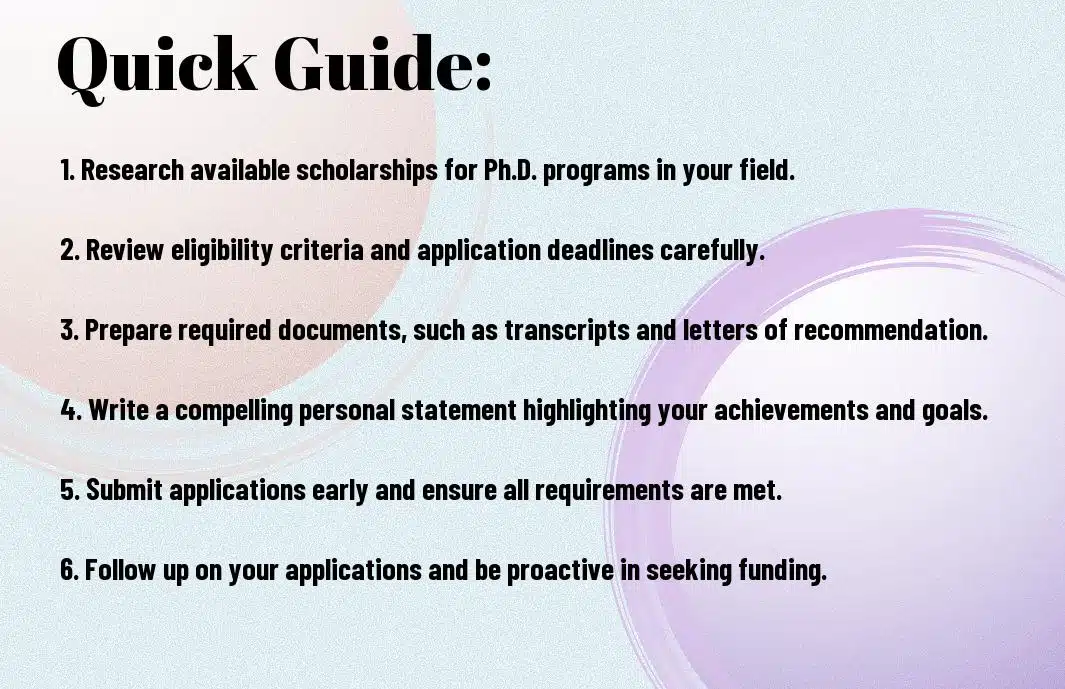Applying For Scholarships Program Pursuing a Ph.D. is a rewarding journey that can elevate your academic and professional career to new heights. However, the cost of tuition and living expenses can be a significant barrier for many students. That’s where scholarships come in. Scholarships can greatly alleviate the financial burden of your Ph.D. program, allowing you to focus on your research and studies without worrying about finances. In this comprehensive guide, we will walk you through everything you need to know about applying for scholarships for your Ph.D. program, from where to find them to how to craft a standout application that showcases your strengths and accomplishments. Let’s dive in and pave the way for your successful Ph.D. journey.
Key Takeaways:
- Start early: Begin researching and applying for scholarships well in advance to increase your chances of securing funding for your Ph.D. program.
- Customize your application: Tailor each scholarship application to highlight your unique qualifications, experiences, and career goals to stand out to selection committees.
- Follow instructions carefully: Pay close attention to all requirements and guidelines provided by scholarship providers to ensure your application is complete and meets all criteria for consideration.

Understanding the Types of Scholarships
If you’re considering applying for scholarships for your Ph.D. program, it’s necessary to understand the different types available. Scholarships can be categorized into several types, including merit-based scholarships, need-based scholarships, institutional scholarships, government-funded scholarships, private and foundation scholarships, and international scholarships. Each type has its own set of criteria and application requirements, so it’s crucial to know the differences between them.
| Merit-Based Scholarships | Recognize academic achievement and accomplishments |
| Need-Based Scholarships | Support students with demonstrated financial need |
| Institutional Scholarships | Offered by the university or college |
| Government-Funded Scholarships | Provided by government agencies or departments |
| Private and Foundation Scholarships | Supported by private organizations or foundations |
Merit-Based Scholarships
An excellent academic record and significant achievements in your field of study can make you eligible for merit-based scholarships. These scholarships are awarded based on your academic performance, research projects, publications, or other accomplishments.
Need-Based Scholarships
There’s a significant emphasis placed on financial need when it comes to need-based scholarships. Students who demonstrate financial need through FAFSA or other documentation are considered for these scholarships, which aim to help students with limited financial resources.
Need-Based Scholarships: It’s important to note that need-based scholarships may cover tuition, fees, books, and living expenses for students who demonstrate significant financial need.
Institutional Scholarships
Scholarships offered by colleges or universities to attract top students to their programs fall under institutional scholarships. These scholarships may be merit-based or need-based and are typically tailored to the institution’s specific requirements and goals.
The: Institutional scholarships can vary in terms of eligibility criteria, application process, and award amounts, so it’s necessary to research each institution’s offerings carefully.
Government-Funded Scholarships
Even government agencies provide scholarships to support students pursuing higher education. These scholarships are often awarded on a competitive basis and may cover tuition, fees, and other expenses related to the Ph.D. program.
It: Government-funded scholarships can be highly competitive, so it’s crucial to start the application process early and submit all required documentation on time to be considered for these prestigious awards.
Private and Foundation Scholarships
While private organizations and foundations offer scholarships to support students in various fields of study, these scholarships typically have specific eligibility criteria and application requirements. Students can explore a wide range of private and foundation scholarships to finance their Ph.D. programs.
Scholarships: Private and foundation scholarships can be a valuable source of funding for Ph.D. students, as they may offer substantial financial support and recognition for academic achievements.
International Scholarships
For international students pursuing a Ph.D. program, international scholarships provide an opportunity to study abroad and access resources not available in their home countries. These scholarships may cover tuition, housing, and other expenses, making them attractive options for students seeking education opportunities beyond their borders.
Scholarships: Scholarships for international students often require additional documentation, such as proof of English proficiency and academic transcripts, so be prepared to meet all requirements when applying for these scholarships.
Preparing to Apply: Factors to Consider
Not sure where to begin when applying for scholarships for your Ph.D. program? There are several factors to consider that can help you navigate the process smoothly and increase your chances of success. From eligibility requirements to timing and deadlines, it’s crucial to be well-prepared before starting your applications.
Eligibility Requirements
For any scholarship application, the first step is to thoroughly review the eligibility requirements. Make sure you meet all the criteria before investing time and effort into the application process. Common eligibility requirements include academic achievements, research interests, and sometimes even financial need.
Researching Scholarship Opportunities
Factors to consider when researching scholarship opportunities include the focus of the scholarship, the organization offering it, and any specific requirements or preferences they may have. Another important consideration is the deadline for each scholarship. Some may have deadlines far in advance, so it’s crucial to plan your application timeline accordingly.
Timing and Deadlines
Eligibility is just one piece of the puzzle when it comes to applying for scholarships. Timing and deadlines play a critical role in your application process. Be sure to create a schedule that includes enough time for researching, gathering materials, and writing compelling essays. Missing deadlines can significantly reduce your chances of receiving scholarship awards.
Step-by-Step Application Process
Gathering Required Documentation
There’s no doubt that gathering all the necessary documentation can be a daunting task, but it is a crucial step in the scholarship application process. Make sure to collect your academic transcripts, letters of recommendation, personal statement, and any other required materials well in advance to avoid any last-minute stress.
Crafting a Persuasive Personal Statement
While grades and test scores are important, a persuasive personal statement can be the deciding factor in your scholarship application. Use this opportunity to showcase your passion for your field of study, your career goals, and how obtaining the scholarship will help you achieve them.
A well-crafted personal statement should be concise, engaging, and unique. Highlight your strengths and experiences that make you stand out from other applicants.
Securing Strong Letters of Recommendation
Strong letters of recommendation can significantly boost your scholarship application. Reach out to professors, mentors, or employers who know you well and can speak to your academic achievements, character, and potential for success in your Ph.D. program.
Plus, make sure to provide your recommenders with all the necessary information about the scholarship and a clear deadline to ensure they submit their letters on time.
Submitting Your Application
Process It is crucial to double-check all components of your application before hitting the submit button. Make sure all required fields are filled out, documents are attached, and deadlines are met. Submitting a complete and polished application will demonstrate your commitment to the scholarship committee and increase your chances of being selected.
Tips for a Successful Scholarship Application
Despite the competitiveness of Ph.D. scholarship applications, there are strategies you can employ to increase your chances of success.
Tailoring Your Application
Successful scholarship applications require careful tailoring to each program’s specific requirements and criteria. Make sure to highlight your relevant experiences, achievements, and goals that align with the scholarship’s values and objectives.
Staying Organized
Your organization skills will play a crucial role in managing multiple scholarship applications effectively. Create a spreadsheet or document tracking deadlines, required documents, and any specific instructions for each application.
Following Up on Applications
Successful applicants understand the importance of following up on their scholarship applications. Sending a thank-you email after submitting your application shows professionalism and genuine interest in the opportunity.
Evaluating the Pros and Cons of Scholarships
Pros of Receiving a Scholarship
Some
Receiving a scholarship for your Ph.D. program can have numerous advantages. Firstly, it can significantly reduce the financial burden associated with pursuing advanced education. Scholarships can cover tuition fees, living expenses, research costs, and more, allowing you to focus on your studies without worrying about the financial aspect. Additionally, receiving a scholarship is a prestigious recognition of your academic abilities and potential, which can enhance your professional reputation and future career opportunities.
Cons and Potential Challenges
If
While scholarships offer many benefits, it is important to consider potential challenges as well. One major downside is the intense competition for scholarships, as many qualified candidates apply for a limited number of opportunities. Additionally, some scholarships may come with strict academic or research requirements that could add pressure to your already demanding Ph.D. program.
Evaluating the pros and cons of scholarships is crucial before applying for them. While scholarships can provide financial support and recognition, the competition and requirements can pose challenges. It is important to weigh these factors carefully and make an informed decision based on your academic goals and priorities.
Also Read : 10 Best Universities In The World For Scholarships
Summing up
Ultimately, applying for scholarships for your Ph.D. program can be a daunting task, but with the right strategy and preparation, you can increase your chances of securing funding for your studies. By understanding the various types of scholarships available, conducting thorough research, showcasing your uniqueness and strengths in your applications, and staying organized throughout the process, you can significantly enhance your scholarship application. Remember to start your search early, seek out resources and support, and never underestimate the power of perseverance and determination in achieving your goal of obtaining funding for your Ph.D. program.
FAQs
Q: What are the benefits of applying for scholarships for a Ph.D. program?
A: Applying for scholarships for your Ph.D. program can help reduce the financial burden of pursuing advanced education. Scholarships can cover tuition, research expenses, and living costs, allowing you to focus on your studies without financial stress.
Q: How can I find suitable scholarships for my Ph.D. program?
A: To find scholarships for your Ph.D. program, you can search online scholarship databases, check with your university’s financial aid office, explore opportunities offered by professional organizations in your field, and reach out to potential research advisors for funding options.
Q: What tips can help me increase my chances of securing a scholarship for my Ph.D. program?
A: To enhance your chances of securing a scholarship for your Ph.D. program, make sure to start the application process early, tailor your application materials to each scholarship opportunity, highlight your academic achievements and research experience, secure strong letters of recommendation, and submit a polished and compelling personal statement outlining your academic and career goals.






